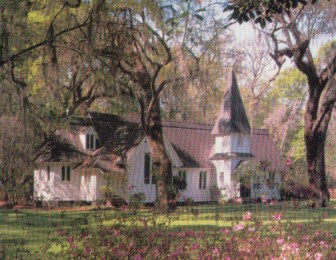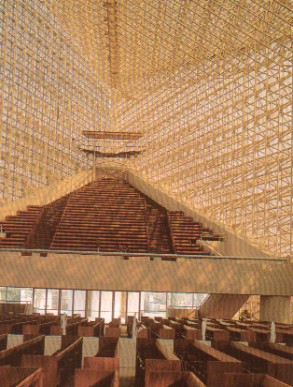|
● Religious
Liberty
● Protestants
in the United States
● CathoLics
● Three
Faiths
● Religious
Diversity
● American
Character of Religion
American Character of Religion
 Some
phenomena in American religion are uniquely American. First of all,
Americans with different religions live together under the same
law. The Bill of Rights in the U.S. Constitution insists
that there should be no state religion. That means that the government
has no right to interfere in people's religious affairs. The freedom
of religion and the separation of state and church guaranteed in
the Constitution are believed to be the basic principles against
religious persecution. Due to this tradition and the basic law about
religion, various religious groups in America have coexisted
more harmoniously than the Old World. Some
phenomena in American religion are uniquely American. First of all,
Americans with different religions live together under the same
law. The Bill of Rights in the U.S. Constitution insists
that there should be no state religion. That means that the government
has no right to interfere in people's religious affairs. The freedom
of religion and the separation of state and church guaranteed in
the Constitution are believed to be the basic principles against
religious persecution. Due to this tradition and the basic law about
religion, various religious groups in America have coexisted
more harmoniously than the Old World.
 |
|
A
Church in Georgia
|
 |
|
Crystal
Cathedral in LA
|
 Secondly,
the religious beliefs of Americans continue to be strong with social
progress.Every Sunday morning, all over America, people pour into
the churches.Half of American Protestants are active church members,
and there are few who habitually stay away. Not only the Catholic
churches, but the Protestant ones too, are flourishing, and new
church buildings, some with interesting architecture, keep pace
with the ever-growing suburbs. Yet in England, leaving aside the
Catholics, four-fifths of the people go to church less than once
a month, and in Sweden the vast majority hardly ever go to church
at all. In America, through all the social and economic changes
religion has remained a constant factor. In
Europe, scientific and economic advance and rising material prosperity
have been accompanied by a decline in religious observance, but
in the United States this has not happened. Secondly,
the religious beliefs of Americans continue to be strong with social
progress.Every Sunday morning, all over America, people pour into
the churches.Half of American Protestants are active church members,
and there are few who habitually stay away. Not only the Catholic
churches, but the Protestant ones too, are flourishing, and new
church buildings, some with interesting architecture, keep pace
with the ever-growing suburbs. Yet in England, leaving aside the
Catholics, four-fifths of the people go to church less than once
a month, and in Sweden the vast majority hardly ever go to church
at all. In America, through all the social and economic changes
religion has remained a constant factor. In
Europe, scientific and economic advance and rising material prosperity
have been accompanied by a decline in religious observance, but
in the United States this has not happened.
 Thirdly,
in the United States every church is a completely independent organization,
and concerned with its own finance and its own building. There has
been little concentration on doctrine or religious argument such
as in European history. If
one goes to a Protestant church, he or she will hear morality
preached,
but
not a word of doctrine.
Anglicans
do not pay much attention to 39 articles
on which the belief of the Anglican Church is based. Churches
and religious sects are expressions of group solidarity rather than
of rigid adherence
to doctrine. Baptist ministers are invited to preach
in Methodist churches. Exchange of pulpits
has been common for many years. A Protestant family moving to a
new place will probably try out several of the nearby churches before
deciding on the one that suits them best, not for doctrinal reasons,
but that is where they find their friends. Thirdly,
in the United States every church is a completely independent organization,
and concerned with its own finance and its own building. There has
been little concentration on doctrine or religious argument such
as in European history. If
one goes to a Protestant church, he or she will hear morality
preached,
but
not a word of doctrine.
Anglicans
do not pay much attention to 39 articles
on which the belief of the Anglican Church is based. Churches
and religious sects are expressions of group solidarity rather than
of rigid adherence
to doctrine. Baptist ministers are invited to preach
in Methodist churches. Exchange of pulpits
has been common for many years. A Protestant family moving to a
new place will probably try out several of the nearby churches before
deciding on the one that suits them best, not for doctrinal reasons,
but that is where they find their friends.
 Several
explanations may be offered. In
American history, religion has not been identified with an oppressive
or dominant social class or set of political institutions.
The Pilgrim Fathers,
and many of those who followed them, left Europe to be free to worship
in their own way, not as the established authorities told them to.
Although some religious groups were also persecuted in early America
and Catholics were prejudiced against, generally speaking, Americans
have enjoyed greater religious freedom than Europeans. Paradoxically,
the
original basis of freedom creates a social pressure in favor of
religion. Most
people want to identify themselves with dominant values, and going
freely to the church of one's choice is a way of doing so, and of
gaining acceptance in the face of a subtle
demand
for conformity.
And the church is a place where people can meet others with whom
they would like to make friends. Religion,
for most people, is important mainly as a means of getting together
with others in a context which is so little defined that its values,
expressing merely generally good will, can be easily shared.
People go to church , and it helps them feel that they have a place
in a community. Several
explanations may be offered. In
American history, religion has not been identified with an oppressive
or dominant social class or set of political institutions.
The Pilgrim Fathers,
and many of those who followed them, left Europe to be free to worship
in their own way, not as the established authorities told them to.
Although some religious groups were also persecuted in early America
and Catholics were prejudiced against, generally speaking, Americans
have enjoyed greater religious freedom than Europeans. Paradoxically,
the
original basis of freedom creates a social pressure in favor of
religion. Most
people want to identify themselves with dominant values, and going
freely to the church of one's choice is a way of doing so, and of
gaining acceptance in the face of a subtle
demand
for conformity.
And the church is a place where people can meet others with whom
they would like to make friends. Religion,
for most people, is important mainly as a means of getting together
with others in a context which is so little defined that its values,
expressing merely generally good will, can be easily shared.
People go to church , and it helps them feel that they have a place
in a community.
Previous Page Next
Page
|

